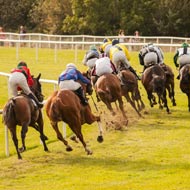Equine racing fatalities ‘at record low’

Equine fatalities in racing fell to a record low of 0.18 per cent in 2015.
Equine fatalities in racing fell to a record low of 0.18 per cent in 2015, according to the latest figures from the British Horseracing Authority (BHA).
The figure was down from 0.22 per cent in 2014 and 0.28 per cent in 1994.
In a summary of key equine welfare statistics, BHA said that after careful analysis of the Cheltenham horse faller data, two fences have been moved in position for 2017.
There will be 10 racecourse veterinary surgeons and two veterinary nurses on duty on each day of Cheltenham, as well as at least three BHA regulatory vets and nine equine welfare integrity officers.
Aintree has also taken major steps to improve the safety of the course and Grand National, according to BHA. Over £1.5 million was invested in safety measures at the course ahead of the 2013 Grand National, including replacing inner frames of fences to a more forgiving, flexible plastic.
Overall British Racing has invested £32 million in veterinary research and education since 2000.
BHA has published a full summary and infographic.



 The Veterinary Medicines Directorate (VMD) is inviting applications from veterinary students to attend a one-week extramural studies (EMS) placement in July 2026.
The Veterinary Medicines Directorate (VMD) is inviting applications from veterinary students to attend a one-week extramural studies (EMS) placement in July 2026.